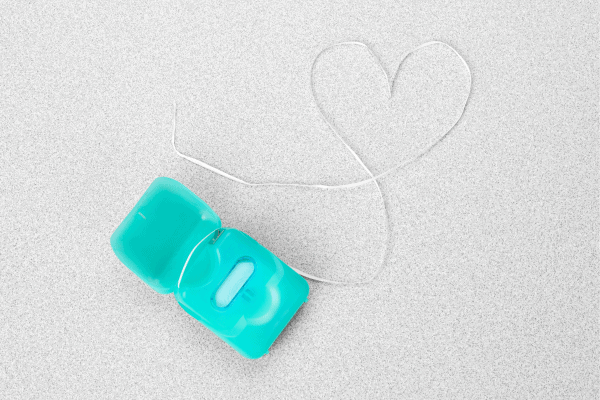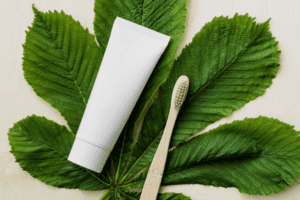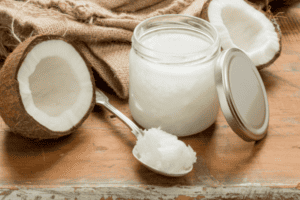9 Non-Toxic Dental Floss Options with No PFAS!
Here’s why you may want to switch to non-toxic dental floss, and what natural dental floss to use instead!
Flossing every day is one of the most important things you can do, for good dental health. But if you are just starting out on your clean living journey, you may be wondering if traditional dental floss is toxic. And if it is, what non-toxic dental floss options are available.
No worries though, I’ve got you covered! In this post, we’ll go over which dental floss brands are indeed harmful to your health, and why. And I’ll share with you nine safe dental floss options for you to choose from!
It’ll make switching easy. So, let’s get started!
This post contains affiliate links. You can learn more here.
Pin this image for later!
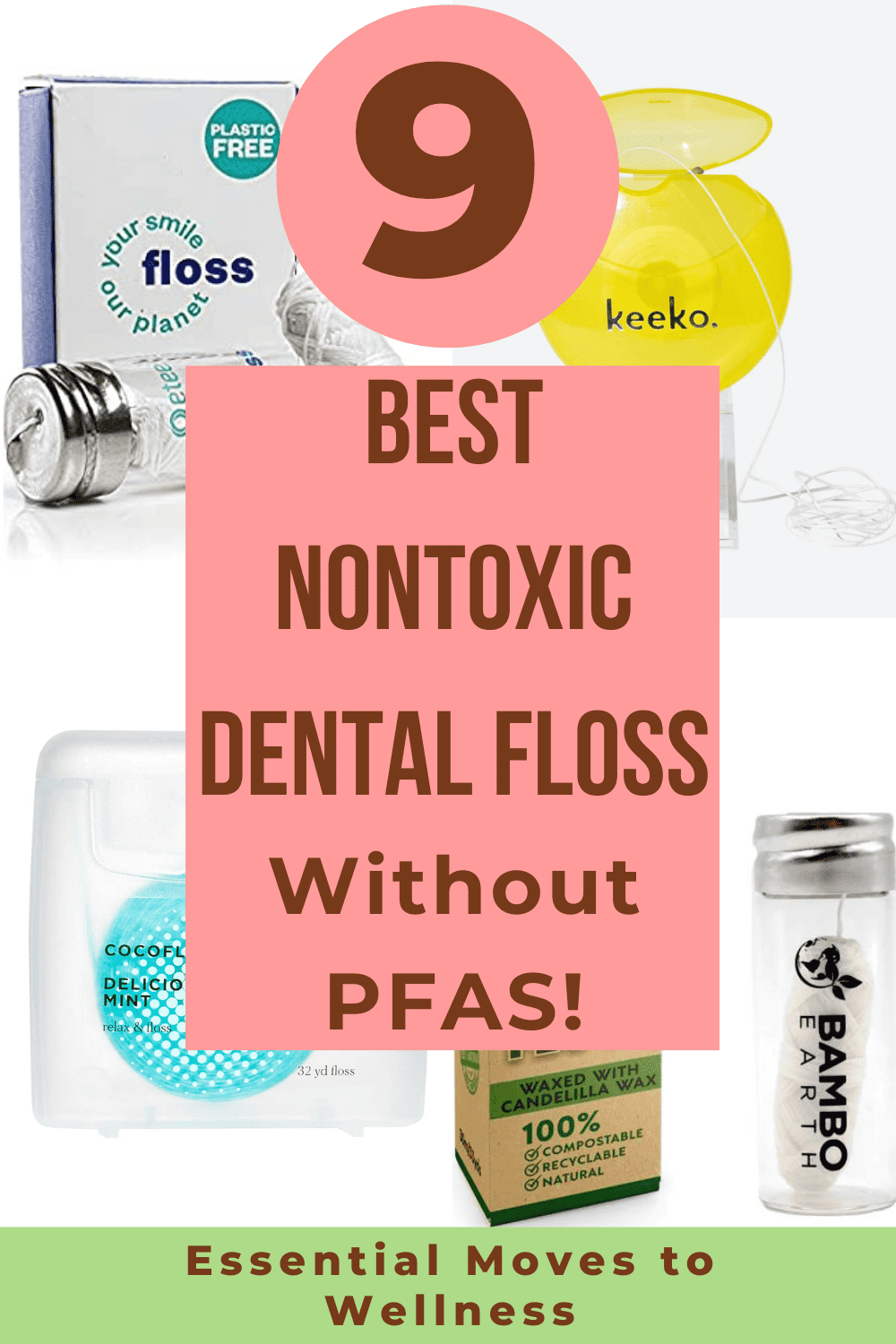
Is Floss Toxic?
Yes, conventional floss is typically toxic to your body, and environmentally toxic as well.
Most floss is made from nylon or polyester. Nylon and polyester are synthetic materials, that don’t break down. They aren’t biodegradable materials. This makes them harmful to the environment.
But that strand of floss cannot be broken down by your body either. So, if you should happen to swallow a bit of floss, your body won’t know what to do with it. I’m sure we’ve all had a strand of floss break or tear and get caught in our teeth before.
On top of that, most wax coated floss contains PFAS chemicals. PFAS stands for the entire class of perfluoroalkyl and polyfluoroalkyl substances. There are 9,000 different chemicals that are known PFAS substances!
These chemicals are nicknamed “the forever chemicals” because they don’t break down. Not in the environment and not in our bodies. And get this; it takes nine years for PFAS to fully leave our bodies!!
PTFE is one such PFAS. PTFE is another name for Teflon. Yep, the stuff nonstick pans are made from!
Teflon gives conventional dental floss that nonstick feel, so that it can easily glide through your teeth. PFAS are also used in floss because they are water and grease resistant. So that strand of floss doesn’t break down or lose its strength when it gets wet from your saliva.
I’ve tried some really bad floss over the years that didn’t have PFAS in them, but the trade-off was that the string broke at about every other tooth. Not good. But don’t worry, this list doesn’t have any of those!
But these toxic chemicals can get wedged between your teeth as you floss, and mix with your saliva, traveling into your body, and potentially, into your blood stream.
Yes, the quantities are probably unbelievably small. But PFAS are all around us! They have been historically used in so many products.
Things like cleaning products, water-resistant fabrics, and grease-resistant paper. Personal care products, such as shampoo, nail polish, and eye makeup also have PFAS in them.
We are exposed to so many sources of PFAS. One study found PFAS in the blood of 97% of Americans.
If you can reduce your intake even just a little bit, by switching to clean beauty products, that will help reduce your exposure to PFAS.
What Harmful Chemicals Can Be Found In Dental Floss?
PFAS aren’t the only harmful chemicals found in dental floss, although they are the most concerning. Here’s a list of toxic chemicals found in conventional dental floss:
- PFAS – linked to thyroid disease, cancer, autoimmune diseases, neurotoxicity, Alzheimer’s Disease, high cholesterol, high blood pressure, liver damage, kidney damage, hormonal imbalances, reproductive effects, low birth weight, and developmental delays.
- Petroleum – acts as an endocrine disruptor, mimicking the hormones your body produces. Nylon and polyester flosses are made from petroleum, and the wax on most conventional floss is derived from petroleum as well.
- Phthalates – these, too, are endocrine disruptors, linked to infertility and thyroid disfunction.
- Plasticizers – nylon and polyester are made from plastic, which is derived from petroleum, and often contains BPA (Bisphenol – A), which is a known endocrine disruptor.
Interestingly enough, dental companies are not required to list their floss ingredients. But a study by Boronow, K.E., Brody, J.G., Schaider, L.A., et al tested 18 brands of floss and found six that contained PFAS.
What Floss is Not Toxic?
Obviously, any floss that does not contain PFAS is a good choice. But you also have to watch out for petroleum, plasticizers, and phthalates.
If you want a truly natural dental floss, look for brands that are made from:
- Silk – natural silk is biodegradable, sustainable, and good for the environment. If you are worried about the treatment of the silkworms during harvest, look for a floss made with Peace Silk. Peace Silk assures that the breeding and harvesting of the silkworm is safe, so that they can complete their metamorphosis.
- Bamboo – bamboo floss is also biodegradable but getting it into a useable form takes a lot of chemicals. So be sure to find out how the bamboo is processed before purchasing.
- Corn fibers – corn fibers are natural, vegan, eco-friendly, and sustainable. Again, you need to be careful, because some corn is genetically modified, so look for floss made from non-GMO corn.
It can be difficult to find a brand of floss that is all natural and toxin-free, particularly because many brands do not list their ingredients. That’s why I put together this list – to make it easier for you!
Natural Dental Floss Brands I Recommend
Now, some of these flosses are made from polyester and nylon. I know both are made from plastic, but I wanted to include them as an option. If natural animal and plant fibers don’t work for you, I wanted to give you the safest options for a more traditional floss.
This list consists of entirely PFAS-free dental floss, however. These flosses are coated in natural waxes; even the flosses made from polyester and nylon.
So, this list should have something for everyone on it! It’s ultimately all up to you and what you value.
Tom’s of Maine Antiplaque Floss
Tom’s of Maine is a nylon floss, but PFAS-free. It is coated in beeswax, carnauba wax, and jojoba wax. It has no artificial sweeteners, preservatives, colors, or flavors. And it’s made with organic spearmint oil.
Although it is packaged with eco-friendly materials, they do use a plastic floss container. If you are environmentally-conscientious, you may be extremely disappointed by this.
But the floss itself is a good, thick, strong floss that does not snap or fray. It is the perfect width for getting in between those pearly whites, cleaning teeth nicely. It has a light, minty flavor as well that I don’t find overwhelming.
Cost: $3.79
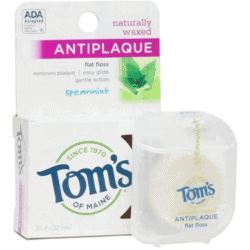
Cocofloss Delicious Mint Floss
Cocofloss Delicious Mint Floss is made from recycled polyester, specifically from water bottles. It is not phthalate or plastic free, since it is made from plastic, but the company does state they are PFAS-free and paraben-free.
Cocofloss is coated with microcrystalline and infused with coconut oils and natural fragrances. The coconut oil is a natural antimicrobial, so it soothes your gums while scrubbing away plaque.
It’s also very grippy between the teeth. It grabs those food particles with no problems! While still being gentle on the gums. It leaves your teeth feeling very clean, with a nice, refreshing mint flavor.
Cocofloss is eco-friendly, vegan, and Leaping Bunny Certified. But it is somewhat more expensive. It does come in super cute packaging, and after trying the floss, I think you’ll agree with how much I love it.
Cost: $9.00
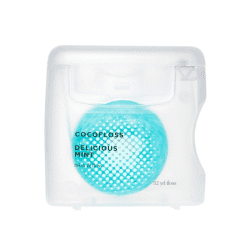
Keeko Vegan Coconut Tooth Floss
Keeko floss is made from bean wax, coconut oil, and natural coconut flavoring. It is coated with a coconut oil based wax as well, so that it glides effortlessly between the teeth and gums.
It is 100% natural, vegan, and comes in a recyclable case.
It’s a bit of a thinner floss, though, so if you have tight teeth, it might not work well for you. It is very smooth, easy to use, and doesn’t break apart. Plus, it has a very fun coconut taste!
Cost: $8
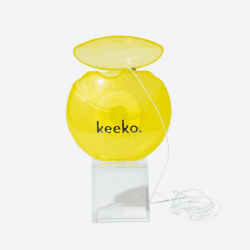
Risewell Scrubby Floss
Risewell floss is not plastic free, as it is made from a polyester filament, but it is PFAS-free, and is not made from a petroleum-based wax.
Risewell is one of the first ever dental companies to use hydroxyapatite in their products, instead of fluoride, including their floss.
Hydroxyapatite is a mineral that makes up most of your bone structure, and when added to dental products, helps the remineralization process of your teeth. You can read all about it in my post on the best hydroxyapatite toothpastes.
Risewell is coated with a vegan wax, and made from spearmint, xylitol, and stevia. It has no artificial flavors, but instead uses essential oils for flavoring.
It is a thin, soft, and gentle floss that expands between your teeth, scrubbing to easily grab food particles and gunk. It’s easy on the gums and doesn’t break or snap, either.
Risewell comes in plastic packaging, but they do encourage you to recycle.
Cost: $8.00
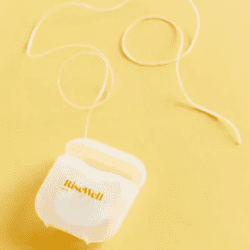
Boka Ela Mint Floss
Boka Ela floss is PFAS-free, plastic free, and petroleum-free. It is instead made with vegetable wax and beeswax, and is mint-flavored.
Boka floss is a bit thicker than Risewell, Cocofloss, and Bamboo Earth, but not as thick as Tom’s of Maine. It might work for you, or it might not. Depends on how tight the space is between your teeth.
Cost: $6.00
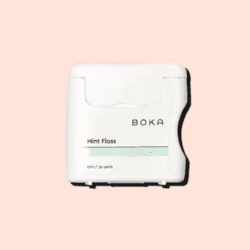
Etee Mint Dental Floss
Etee is a silk floss made from pure mulberry silk. It is not vegan silk, but it is sourced ethically. It is plastic-free, biodegradable, eco-friendly, and organic. Even their packaging is plastic free packaging, made from biodegradable corn starch baggies!
Etee is a thin floss coated with candelilla wax, so it fits well into tight spaces between your teeth. It is gentle on the teeth and the gums. And the silky strand grabs food and tartar better than a lot of the conventional flosses do.
It is very durable. Etee doesn’t break or shred unless you really force it between your teeth. I’ve tried natural dental floss brands similar to this and they all broke, but Etee held up great!
Plus, it comes in an adorable refillable glass container!
Cost: $12 for 2 spools
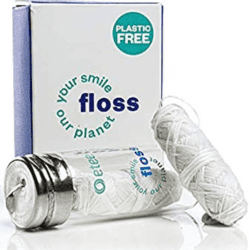
Bamboo Earth Eco Floss
This bamboo floss is also made from natural silk thread, and candelilla wax, so it glides smoothly between teeth.
It is plastic-free, biodegradable, organic, and eco-friendly. It has a light mint flavor, but I’m not sure what actually flavors the floss.
It is a little thicker than some flosses, and a little stiffer. It does not fray, break, or snap. And even though it’s a bit firmer, it gets through tightly fit teeth quite nicely.
Bamboo Earth comes in a cute little reusable glass container that is refillable. It gets a passing grade from me!
Cost: $6.97
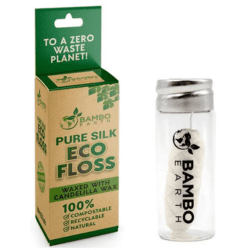
SmartLifeCO Unflavored Dental Floss Picks
These biodegradable dental floss sticks are made from straw wheat. They are unwaxed, unflavored, vegan, plastic free, eco- friendly, and are a certified organic dental floss. Plus, they’ve been tested by dentists!
They are very durable, but super thin, too, so that you can get between those tight teeth. And they don’t break. If you like floss picks, you’ll love these SmartLife floss picks.They are my personal favorite picks to use! 🙂
Cost: $9.99
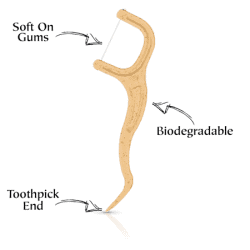
Hello Activated Charcoal Floss
Hello Activated Charcoal Floss is made from bamboo, xylitol, and charcoal. It is coated with candelilla wax and flavored with all natural peppermint.
It is vegan, Leaping Bunny Certified, and made in the USA. It does use plastic packaging, however, so it is not entirely eco-friendly.
It is a super strong, thicker, textured floss, that doesn’t snap or break. It’s comfortable to grab, and easy to slip between the teeth. But it might not work as well if you have super tight teeth.
The fact that it is black makes it easy to see, as well. And no, it won’t stain your teeth! I’m actually super skeptical of activated charcoal whitening your teeth, but it’s there nonetheless.
Cost: $14.39
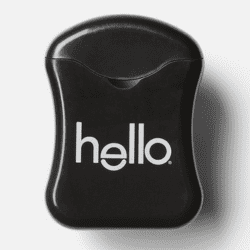
Tips for Shopping for Non-toxic Dental Floss
So, if you are shopping for a safe dental floss, it can get a bit tricky, particularly because the ingredients are not often listed.
Here’s a few tips, to help you find the perfect floss for your needs:
1. Look for a natural silk floss if you can, or one made with bamboo or corn fibers. Nylon or polyester are your next best bet. But keep in mind that they are petroleum-based. Still, flossing with nylon or polyester is better than not flossing at all.
2. If you are vegan, bamboo or corn fiber might be a good option for you.
3. Be wary of labels that say “coating”, “glides easily”, or “glides smoothly”. These usually indicate the floss is made with a wax containing PFAS, or Teflon. The floss brands listed above are all PFAS-free.
4. If you are using a flavored floss, make sure it is flavored from natural substances, and not synthetic fragrances or artificial sweeteners. Since manufacturers don’t have to list what goes into their fragrance, the label can be a catch-all for all sorts of bad stuff.
5. Beware of greenwashing. Even brands that insist they are natural have been guilty of it. To learn more about greenwashing, read my post on greenwashing.
6. Try to avoid floss with labels that list “flavor”, “natural flavors”, or “artificial flavors”. If you want a flavored floss, look for a brand that uses essential oils or extracts.
7. Likewise, if you want a waxed floss, look for a brand that uses beeswax, natural candelilla wax, or carnauba wax.
8. If the floss contains fluorine, it is a good indicator that it contains PHAS.
Look for companies that actually list their ingredients. Just the fact that they do, when they don’t have to, gets brownie points from me! You can tell they are a very health-conscientious company if they go the extra mile and list their ingredients.
Frequently Asked Questions About Safe Dental Floss
If you still have questions about which toxin-free dental floss to buy, no worries! I’ve answered some of the most frequently asked questions for you below. Hopefully you can find your answer there, but if not, definitely put your question in the comments below and I’ll answer it.
Does All Dental Floss Have PFAS?
No, not all dental floss has PFAS in it. In fact, the above-mentioned study, in the Journal of Exposure Science & Environmental Epidemiology, found 12 brands of dental floss that did not have PFAS in them.
The brands that did not have PFAS in them were:
- CVS Unwaxed
- Desert Essence Tea Tree Oil Dental Tape
- EcoDent Gentle Floss Premium Dental Floss with Essential Oils Mint Vegan Waxed
- Johnson & Johnson Listerine Cool Mint Mint Floss
- Johnson & Johnson Reach Clean Paste Icy Mint Woven Floss
- Johnson & Johnson Reach Mint Waxed
- Reach Mint Waxed
- Reach Waxed Unflavored
- Oral-B Complete Deep Ultra Mint
- Oral-B Satin Floss Mint
- Rite-Aide Premium Waxed Mint Floss
- Tom’s of Maine Naturally Waxed Antiplaque Flat Floss
Of course, they didn’t test every brand of dental floss on the market.
And just because these brands are PFAS-free, it does not mean they are non-toxic. That’s why I didn’t provide links to them. You still need to do your homework and make sure there are no fragrances, phthalates, and parabens in these brands.
PFAS is the main offender, but PFAS is not the only thing we want to watch out for when shopping for dental floss.
What Brands of Dental Floss Contain PFAS?
It’s really hard to list all of the brands that do contain PFAS, because I’m sure not every brand has been tested.
But these are the brands that are known to have PFAS in them, according to the above-mentioned study:
- Colgate Total Dental Floss Mint
- CVS Health SuperSlip Ease Between Wax
- Crest Glide Deep Clean Cool Mint Floss
- Oral-B Glide Pro-Health Mint
- Oral-B Glide Pro-Health Original
- Signature Care Mint Waxed Comfort
When looking for PFAS in a brand, keep in mind that if fluorine is listed as an ingredient or anywhere on the label, it has PFAS in it.
Fluorine is a specific element of PFAS and is used to make plastics. It is also used in dental floss – and for the production of nuclear materials. It, too, is linked to many health concerns, including lung damage.
What is the Healthiest Dental Floss to Use?
The healthiest dental floss is silk floss because it is all-natural, eco-friendly, biodegradable, and completely toxin-free.
Bamboo and corn fibers are a close second, but both involve chemicals at some point in the process. Corn fibers are good if you are certain they are non-GMO.
If you decide to use a polyester or nylon-based floss, try to find one that is coated with candelilla wax, beeswax, or carnuaba wax.
I think, though, that any dentist will tell you it is better to floss with a *sigh* toxic brand of floss than it is to skip flossing entirely. So, with that thought in mind, any floss you are willing to use is better than nothing at all.
But that’s why you’re here, right? You want to change all that! Flossing is that important to your dental health.
Should I Use Waxed or Unwaxed Dental Floss?
Waxed or unwaxed is a personal choice.
Some people have really tight teeth, and the waxed floss glides between them better. If that is you, you might want to consider a naturally waxed floss. It should list natural beeswax, candelilla wax, or carnauba wax as an ingredient.
Any of the waxed flosses on the list above are a good choice.
Is it Okay to Reuse Dental Floss?
I’m no dentist, but I’m sure it’s not safe to reuse dental floss. The bacteria and food residue that is stuck on the floss cannot be good for you or your oral health.
You really don’t want to ingest that. If you are still in doubt, ask your dentist.
What Can I Use Instead of Floss?
Some people really despise flossing. If this is you, don’t let the fact that some flosses are toxic be an excuse to give up flossing entirely!
There are other ways to floss. Floss sticks work great for some people. They might be easier for you to use. And they won’t hurt your fingers, because you don’t have to wrap the floss around your fingers. This is actually where I tend to fall on the flossing spectrum.
Otherwise, a water flosser is a great option. You can forgo the string entirely and use water. One study has found that a water flosser is just as effective, and may be even better than, regular floss.
Final Thoughts on Non-Toxic Dental Floss
If you are worried about the harsh chemicals in your dental floss, there are so many better, non-toxic floss options available. You don’t have to settle for a toxic dental floss. My favorite non-toxic dental flosses have a little something for everyone.
You can choose from thick and thinner strands, picks, or regular floss. You can go with the traditional polyester or nylon flosses, coated in natural, PFAS-free waxes, such as candelilla wax, or you can go entirely natural, with bamboo, corn fiber, wheat straw, or silk floss!
You can also choose eco-friendly options with reusable glass containers, and vegan options.
Just remember that any floss you choose is going to be better than not flossing at all. So, choose one you know you will use!
Related to Non-Toxic Dental Floss
What is Hydroxyapatite Toothpaste and What Brands Have it?
7 of The Best Natural Toothpaste Options for a Cleaner Mouth
Your Ultimate Guide to Finding the Best Organic Lip Balm
7 Of the Best Affordable Natural Skin Care Products Actually Worth Trying

